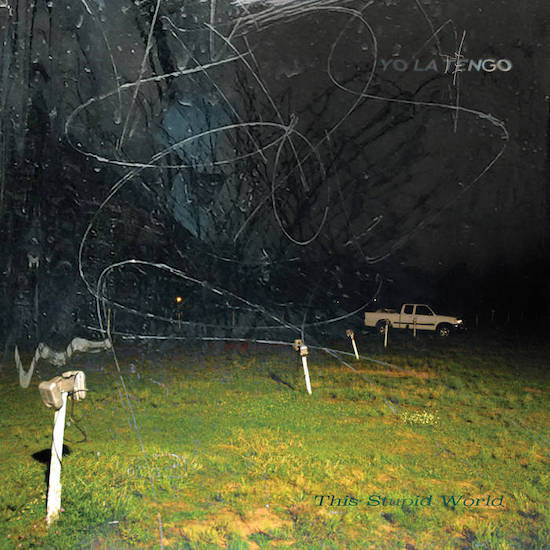There are few acts as good at titling songs and albums as Yo La Tengo. Some come close, Stereolab and Bill Callahan, come to mind. However, there’s a level of excitement conjured by Yo La Tengo’s titles with the potential to match the giddy-feeling of hearing their material for the first time. This is a band, after all, with a discography featuring albums called I Am Not Afraid of You And I Will Beat Your Ass and Popular Songs for a release that wasn’t a late-career “best-of” compilation. There are Simpsons references (‘Let’s Save Tony Orlando’s House’) and a nod to their Lollapalooza days when Moby shared the line-up. Balancing out the in-jokes between Ira Kaplan, Georgia Hubley and James McNew is a great deal of sincerity and sensitivity in the songwriting which builds a bridge between transience and timelessness.
This unwavering sense of humour remains intact for their sixteenth studio album, This Stupid World. While the album title accurately represents collective feelings towards modern life, the actual message and music of Yo La Tengo’s excellent new material is somewhat incongruous. “I want to fall out of time,” sings Ira Kaplan in his distinct lilt on ‘Fallout’, a moment on the record which solidifies their status as one of the finest bands to deliver infectious and raucous indie melodies. This desire to be misaligned with the present moment is one of the defining qualities of the record. Here, in this (far from stupid) sonic world diplomatically led by the New Jersey trio, time is something of a skewed concept. As much as the band wants to escape from the constructs of time, they know they cannot run away from it or its inevitabilities – especially endings. “I can see clearly how it ends,” Kaplan reveals on the opening track, ‘Sinatra Drive Breakdown’ which feels all the more harrowing a few songs later with the arrival of the line: “Prepare to die / Prepare yourself while there’s still time.”
Together as a band for almost forty years – with bassist and vocalist James McNew contributing to three-quarters of that time and thirteen studio albums – Yo La Tengo have never been one to manipulate their artistic expression to fit the musical mould of a particular moment in time. The opening couplet on This Stupid World is instantly reminiscent of fellow former Gilmore Girls guests, Sonic Youth as they bring forth an intensity to the mood. In many ways, This Stupid World sounds like a body of recordings made by the band over a fruitful and fun weekend two decades ago. You could say it’s the sonic equivalent of finding a beloved jumper you’d forgotten about or assumed missing that miraculously re-appears at the back of a dusty drawer. As soon as you step into the world created by the trio, there’s an immediate warmth and familiarity to the compositions.
This is established from the offset with the enveloping rhythmic melody and snarling fuzzed guitars of the commanding opener ‘Sinatra Drive Breakdown’ share a similar temperament to ‘Pass The Hatchet, I Think I’m Goodkind’ from 2006. We stay in that time-period for much of the record, most notably on the multi-dimensional ‘Brain Capers’ and the ritualistically paced ‘This Stupid World’. The retreading of these familiar and quintessential Yo La Tengo-esque arrangements, however, never feels as though the band are regurgitating old songs or struggling with their craft. If anything, they feel engrossed in their playing and the development of these expansive and multi-faceted compositions. To counter the claustrophobic and ferociously intoned tracks, the smoothness of ‘Apology Letter’ ambles away as Kaplan wryly acknowledges some of his lesser character traits (“I was wrong, I knew right away but I played it cool / That trick never works”). Elsewhere, drummer and vocalist Georgia Hubley provides some of the more tender and standout moments with her silky vocal performances on the captivating closer ‘Miles Away’ and the wistful single, ‘Aselestine’.
As with many of Yo La Tengo’s masterful records, This Stupid World meanders its way through the tracklist with ease. There’s a great range of textures and timbres scattered throughout, however the elements required – tonally and thematically – to unify this work are effortlessly applied and done so in a way that has always felt instinctive across Yo La Tengo’s artistry. Furthermore, the use of looped, rhythmic melodies across the record cleverly (and subtly) gives structure to the work. With three of the nine songs clocking in at over seven minutes-long, every note is earned and necessarily. Extended instrumental breaks and outros never feel gratuitous, if anything they allow the listener to fall deeper into the song, to lose track of time.


